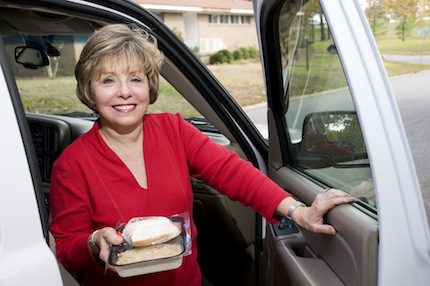
04 Jun 2012 CareLink provides food assistance to elderly
A report released this month from the Meals On Wheels Research Foundation found that the number of seniors experiencing hunger increased 78 percent between 2001 and 2010.
Between 2007 and 2010, the increase was 34 percent. That means one in seven older people in the U.S. and one in five people in Arkansas daily face the threat of hunger.
Alfred Williams of Little Rock is a member of the national Meals On Wheels Research Foundation Board.
“Seniors in Arkansas have the third highest risk for food insecurity in the nation, a rank which we have held for the past few years,” said Elaine Eubank, CEO of CareLink. “The study shows 19.3 percent of older people in Arkansas are at risk for hunger.”
This growing crisis of food insecurity is associated with poor nutrition and health in older people in Arkansas and across the nation. Since poor nutrition is a major factor in health for seniors, it is essential that citizens recognize the situation as a public health challenge.
“By addressing the issue of food insecurity, we can absolutely impact healthcare,” Eubank said. CareLink is working to meet an increasing demand for prepared meals to be delivered to older people in Central Arkansas.
Its current kitchen facility serves meals to about 1,200 people a day, including 800 Meals On Wheels clients, eight Senior Centers and CareLink’s Respite Center. The existing CareLink kitchen was built to serve 250 meals per day and cannot meet the demand for meals, a demand that is expected to triple as baby boomers age.
Last summer, CareLink announced that the old Safeway building at 22nd and Pike in North Little Rock will be repurposed to house its new Community Kitchen facility and the Peggy and Joe Hastings Respite Center. Sen. David and Barbara Pryor, and Mary Steenburgen and Ted Danson are leading the Come to the Table campaign to transform the facility that eventually will expand the CareLink meal preparation capacity to 3,000 meals per day.
“This national study documents the crisis facing seniors in our community, as well as the country, and demonstrates the importance of the CareLink Community Kitchen.” Williams said.
About 8.3 million Americans aged 60 and over face the threat of hunger. The phrase “facing the threat of hunger” is part of the Census Bureau’s Current Population Survey and was used by researchers to mean seniors expressed anxiety about having enough food and sometimes skipping meals because they lacked enough money to buy food. Nearly 15 percent of America’s seniors experienced hunger in 2010, compared with 10 percent in 2005.
"The surprise was that things got worse for seniors," said economist James Ziliak, co-author of the report. The report also found that the chance of an African American senior experiencing hunger was 132 percent higher than a white senior. In addition, seniors living with children were 50 percent more likely to experience hunger, possibly because they would sacrifice their own meals in order to feed their children.
Seniors forget to eat, or are disabled, said Ziliak. Some run out of Social Security income near the end of the month and don’t have the funds to buy food. Others lack transportation to grocery stores. While SNAP/Food Stamps would help these seniors, only 30 percent of eligible seniors nationwide take part in the program.
Last year more than 18,000 people in Faulkner, Lonoke, Monroe, Prairie, Pulaski and Saline counties were CareLinked with information and resources to help them stay active and in their own homes, avoiding more costly care.
Older people and their caregivers can get the information and assistance they need from CareLink at 501.372.5300, toll-free 800.482.6359 or by visiting carelink.org.











